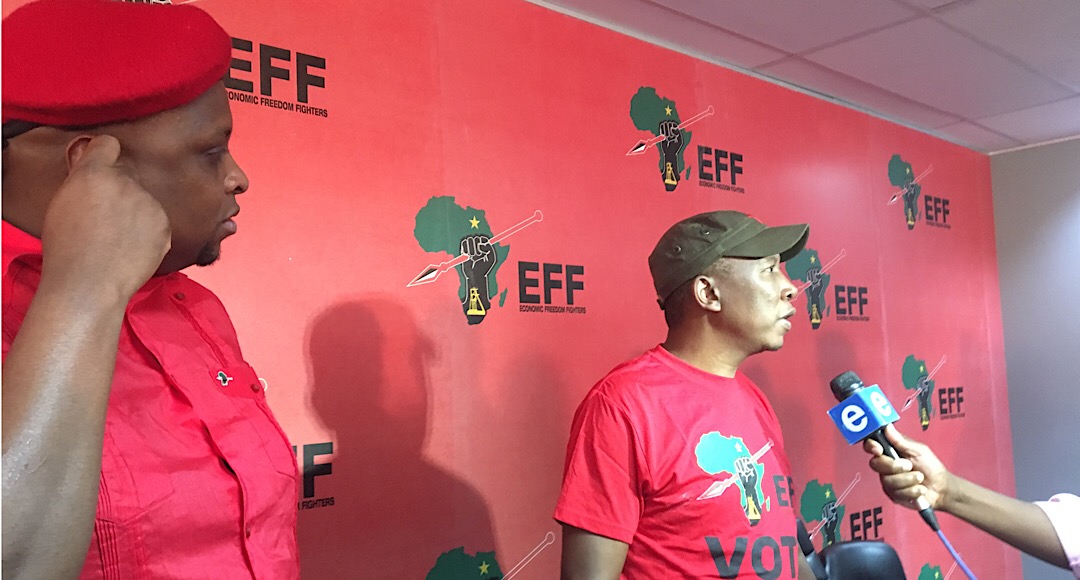It is disturbing enough to hear someone use rape as a metaphor in casual conversation. It’s even worse when the leader of a political party uses rape as a metaphor in the presence of thousands of supporters at a gathering that is being broadcasted to millions.
The Economic Freedom Fighters (EFF) held its election manifesto launch on February 1 in Soshanguve, Tshwane. At the launch, EFF leader Julius Malema addressed the crowd presenting the party’s manifesto outlining its vision for the future. The delivery was, as expected, electric.
The EFF has something for everyone. Its vision ranges from the expropriation of land without compensation to raising the minimum wage and social grants, free education, a united Africa, and the liberation of women and the queer community.
Malema said we need to stop this “nonsense” of violence against queer bodies, that members of the LGBTQI+ community must, too, be able to exercise their rights. From queer rights, he went on to say the EFF will liberate women too. It would have all been good and well until he used rape as a metaphor.
Denouncing the remnants of apartheid in South Africa, Malema said apartheid leaders “raped our people, raped our land, and raped our cattle.” And just like that, he denounced his previous claims of liberating women and queer people.
The worst part is, this isn’t the first time the EFF leader used rape metaphors. In 2016, back when he was still the president, Jacob Zuma mocked Malema during an election campaign speech in the North West and asked how folk could vote for someone who used to say “I will die for Zuma” (referring to Malema).
In response, Malema called Zuma a “dumb fool” and told The Citizen “Zuma wanted to continue molesting me without Vaseline.”
(This is not mentioning what he said of Fezekile Kuzwayo, who accused Zuma of rape in 2009 then died in exile from the country of her birth.)
Colonialism was horrendous, debilitating and inhumane. The same can be said of apartheid. But neither justifies the use of rape to describe them.
Rape is a South African lived reality
Rape, according to the dictionary definition, is the “unlawful sexual intercourse or any other sexual penetration of the vagina, anus, or mouth of another person, with or without force, by a sex organ, other body parts, or foreign object, without the consent of the victim”.
It is not a word that describes unpleasant experiences or even grave injustices. It’s certainly not something that can be flung around in malicious political repartee or at rallies to rile up the crowd and gain votes.
Rape is a grim reality in South Africa. South Africa’s crime statistics presented in parliament last year showed that the police recorded 40,035 rapes in 2017/18 (up from 39,828 in 2016/17). This means an average of 110 rapes were recorded by the police every day. It goes without saying that there are many, many rapes that go unreported. These are staggering figures, some of the worst in the world.
It is the very same reason South Africa is known as the “rape capital” of the world.
Using rape metaphors in 2019, after years of painful conversations about the pervasive rape culture in South Africa, is deeply misogynistic and tone deaf. We’ve had various discussions about cartoonists and artists using rape as a metaphor. It’s especially problematic for the leader of such a formidable political party to use such violent language and to perpetuate rape culture.
To live within a rape culture means to live among a society that implicitly excuses or otherwise tolerates sexual violence. Here, sexual assault, rape, and general violence are ignored, trivialised, normalised, or made into jokes. In a rape culture sexually violent language and behaviour is normal. And the language we use is telling of the society we live in.
Language is a powerful tool: it is telling of how society collectively perceives and conceives of things.
If we want to change how society thinks about and depicts rape, we need to speak about rape with the gravity it deserves. To condone rape metaphors, or any other trivialisation of the very real experience it describes, to skew what rape means, to dilute its meaning, and to make it easy for people to deny its existence.
Rape is a crime, it’s a tragedy. It is not a metaphor. Perhaps when we’re ready as a society to acknowledge that – even in the language we use – then we can be serious about tackling it.
No one knows better than a politician the power of words. We expect better from people touting themselves as the incumbent leaders of our country. Malema’s comments were not a clever way of describing the pillaging and plundering that took place during colonisation and apartheid. His words were lazy, and frankly abhorrent. All it did was further normalise rape in a country where we are already desensitised toward sexual violence.
We need to rage against rape culture, we cannot let Big Men get away with perpetuating it for politics.









